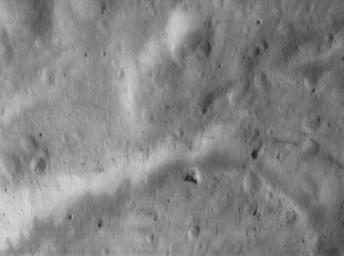
|
Down Slippery Slopes
- Click the image above for a larger view
- Full-Res JPEG (472 x 352) (18.8 kB)
- Full-Res TIFF (472 x 352) (140.9 kB)
Caption:
Even the earliest, low-resolution images of Eros from NEAR Shoemaker show a variety of bright patches and bands on crater walls and other steep slopes. This picture, taken June 16, 2000, from an orbital altitude of 50 kilometers (31 miles), captures bright patches in two different environments. The crater in the top center of the picture has a bright patch on one of its walls, whereas the low, curved escarpment that snakes along the bottom of the image has bright material exposed along its length. The bright patches are a source of speculation, but they may have originated from exposure of subsurface material. The whole scene is approximately 1.9 kilometers (1.2 miles) across.
Background Info:
Built and managed by The Johns Hopkins University Applied Physics Laboratory, Laurel, Maryland, NEAR was the first spacecraft launched in NASA's Discovery Program of low-cost, small-scale planetary missions. See the NEAR web page at http://near.jhuapl.edu/ for more details.
Cataloging Keywords:
| Name | Value | Additional Values |
|---|---|---|
| Target | 433 Eros | |
| System | Near Earth Objects | |
| Target Type | Asteroid | |
| Mission | NEAR Shoemaker | |
| Instrument Host | NEAR Shoemaker | |
| Host Type | Orbiter | |
| Instrument | Multi-Spectral Imager (MSI) | |
| Detector | ||
| Extra Keywords | Crater, Grayscale | |
| Acquisition Date | ||
| Release Date | 2000-07-06 | |
| Date in Caption | 2000-06-16 | |
| Image Credit | NASA/JPL/JHUAPL | |
| Source | photojournal.jpl.nasa.gov/catalog/PIA02929 | |
| Identifier | PIA02929 | |
